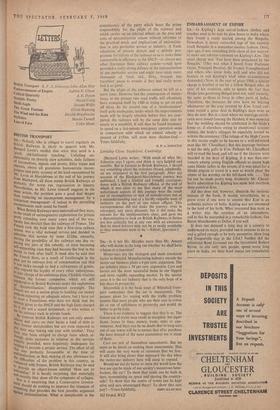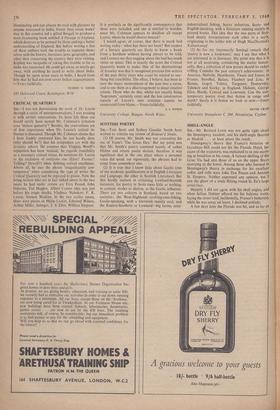EMBARRASSMENT OF EMPIRE
SIR,—In Kipling's days out-of-fashion clothes and coaches used to be sent by slow boats to India where they found a ready market among the Bengalis. Nowadays, it seems outmoded tags of this country reach Bengalis in a somewhat similiar fashion. Once, ages ago, it was something little short of lose ntajeste to make any adverse comment on Kipling's Kim, The usual charge was 'You have been prejudiced by the Bengalis.' (This was what I heard from Professor Oaten, Principal Percival, Sir Francis Younghusband and others who knew India well and who did not hesitate to call Kipling's bluff when circumstances demanded.) Now, in the year of grace 1960, a similar charge is levelled at me by a fellow Bengali who, in spite of his erudition, opts to ignore the fact that Hindu laws governing Bengal were not, until recently, the same as those in force in other parts of India. Therefore, the instances he cites have no bearing whatsoever on the area covered by Kim. Local cus- toms varied a great deal in Kipling's days even as they do now. But in a land where no marriage certifi- cates were issued (among the Hindus), it was essential that the wedding should be celebrated in the bride's home or, if elsewhere owing to exceptional circum- stances, the bride's villagers be especially invited to witness the ceremony. (The rulings of the High Courts in this matter ought to be known to a well-informed man like Mr. Chaudhuri.) But this marriage business is not the only gaffe in Kim. Perhaps Mr. Chaudhuri will re-read the book and tell me if the Ooriyas were bearded in the days of Kipling, if it was then cus- tomary among young English officials to accost high caste Hindu ladies in the streets, if it was usual for a Hindu pilgrim to travel in a way as would place the object of his worship on his left-hand side. . . . The list can be made pretty long. Evidently Mr. Chaud- huri's admiration for Kipling has made him overlook these points in Kim. All this does not, however, diminish the intrinsic interest of the book. It would, nevertheless, be a grave error if one were to assume that Kim is an authentic picture of India. Kipling was not interested in the land of his birth. What interested him most as a writer was the creation .of an atmosphere, and in this he succeeded in a remarkable fashion, like Baron Munchausen or Defoe, if you will.
It does not demand a long stay in a country to understand its ways, provided one is anxious to do so and is gifted enough to be truly perceptive. How long did Tocqueville stay in the USA? Neither did the orientalist Rend Grousset nor the byzantinist Robert Byron, to cite only twb people, spend seven long years in India, yet their brief essays are remarkably
illuminating and can always be read with pleasure by anyone interested in India. Fewer than seven weeks' stay in this country led a gifted Bengali to produce a most fascinating book entitled A Passage to England, which deserves to be perused by those seeking a better understanding of England. But before writing a line all these authors took the trouble to acquaint them- selves with the history, literature, laws, geography, and other data concerning the country they were visiting. Kipling was incapable of taking this trouble as far as India was concerned. He could get away, or nearly get away, with anything he cared to write about India. Though he spent seven years in India, I heard from him that he had not even seven Indian acquaintances. —Yours faithfully,
SUDIIIN N. OTIOSE











































 Previous page
Previous page